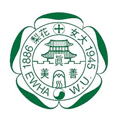Universities in South Korea

Ewha Womans University
Seodaemun-gu, South Korea
Established in May, 1886, Ewha Women’s University has been known for admitting female students mainly. Their primary goal is to improve lives of oppressed women in the society. Located in Korea, it is the largest known women’s university in the world with about 14,156 college students and about 5,654 graduates currently enrolled and with a total number of 146,765 graduates from the school. The undergraduate colleges include Liberal arts, Social sciences, Pharmacy, Health sciences, Music, Law to mention a few. They also teach post-graduate courses in the same areas as mentioned above.... See full description.

SolBridge International School of Business
Daejeon, South Korea
Woosong Education Foundation, our principal funding source, was founded in 1954 by Kim Jung-Woo with the aim of educating students who could take the initiative in rebuilding the Korean economy.
Towards the end of the 20thcentury Woosong Education Foundation established a new undertaking, a university, to contribute to the Global community. Since 1994, when our sister university, Woosong University, was founded, it has earned a reputation for excellence in preparing students for practical careers.
The creation of SolBridge in 2007 was a natural extension of the academic activism we... See full description.
Universities in South Korea by City:
Andong CityDaejeonPohangSeodaemun-guSeoulYeongtong-guYongsan-guAbout universities in South Korea
There are more than 300 higher education institutions in South Korea, which include public and private colleges and universities. The higher education sector has experienced a dramatic expansion over the last five decades in South Korea. Currently, more that 95 percent students graduate from high school and more than 75 percent of them pursue higher education. The enrollment rate to higher education in South Korea is one of the highest in the world.
The tertiary education sector in Korea comprises four year colleges and universities, cyber colleges, teachers’ universities and technical universities. The ministry of Education and Human Resource Development regulate these institutions.
Admission to an elite university in South Korea requires applicants to excel in specific entrance examinations. The Ministry of Education controls these examinations. Bachelor’s degree, master’s degree and doctorate degree comprise the three tier structure of higher education in South Korea.
First tier- Bachelor’s Degree in Korea
Universities and colleges in Korea offer four year bachelor’s degree programs in various disciplines. Those who want to secure an admission into a bachelor degree program will need to take the College Scholastic Ability Test, which is conducted on five sections like Math, English, Korean language reading and some elective subject. Those who do not score satisfactory marks on the test can opt for deferring the college entrance, and study another year to score higher.
The universities offering degree programs in medicine, dentistry and oriental medicine require students to complete a six year program successfully.
In addition, junior college diplomas and associate degrees are also offered at the undergraduate level by universities in South Korea.
Second tier- Master’s Degree in Korea
Master’s degree in South Korea involves two years of study, which include a thesis. Those who have completed their bachelor’s degree successfully can apply for a master’s degree in South Korea. Most of the universities expect the candidates to have proficiency in English. If the medium of instruction of the chosen course is English, applicants need to have a TOEFL iBT score of 79 to 80, or get a score of 6.0 or more in IELTS. However, for programs taught in Korean, TOPIK scores are taken into account. The candidates need to have performed well in undergraduate studies, and should have passed the entrance test with satisfactory marks to gain admission into a master’s degree program at universities in South Korea.
Master of Business Administration is one of the most popular degree programs in South Korea. The candidates can find MBA programs with diverse specializations like information and media MBA, finance MBA and technology MBA. Master’s level programs in business administration usually require 30 to 40 credit hours.
In South Korea, the master’s degree programs usually consist of spring and fall semesters that last from March to June and September to December respectively.
Doctorate Degrees in Korea
A doctorate degree requires three to four years to complete. Those who have completed their master’s degrees with a decent score and have passed the entrance exam can get admission into the PhD programs. The student needs to choose a subject for the dissertation and conduct initial research on that subject. He/she can enter into the independent research phase, after getting approval for his/her research design and proposal from the dissertation advisor. Doctoral degree is awarded, if a student has established mastery over the subject, and defended his/her research findings.
Higher education is crucial for most South Koreans. Almost all major cities in South Korea have their own universities.

